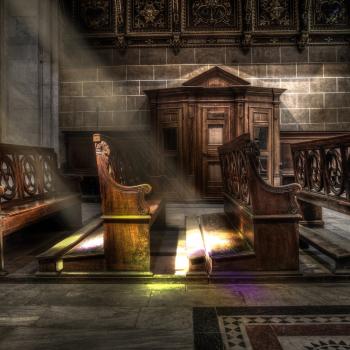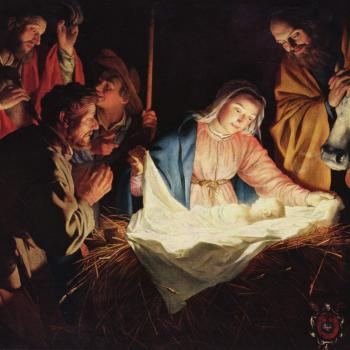
One of the most impactful things to happen to the Christian faith since the printing press is the internet.
Thirty years ago, we didn’t have instant access to more religious texts than we could possibly read in a lifetime. We weren’t able to connect with like-minded, or more importantly, not-so-like-minded people from across the world. We were instead limited to our immediate communities and only the beliefs and attitudes that happened to be expressed locally.
The door is wide open now. With social media, we’re consistently exposed to people who are exactly like us as well as people who don’t seem to have anything in common with us. We’re able to cultivate these online bubbles around ourselves, if we choose, or we can break through those bubbles to engage people who think we are very, very wrong and aren’t shy about letting us know.
I believe the internet has been a real gift to Christians, especially when it comes to social media. While we can do an awful lot of damage online, social media also gives us just as much potential to do good.
I’ve asked four Christian leaders to weigh in on the ways online communities play a role in the Christian faith. They are from different backgrounds but share one main thing in common: I met all of them in online communities.
Although I haven’t been lucky enough to meet any of them in person yet, I’ve come to respect each of them and the ways they minister to the greater body of Christ, beyond their local community, through their online interactions.
So what do a Catholic monk and priest, a Protestant reverend, an Anglican bishop, and a Church of Christ pastor have to say about the ways Christians interact online?
Let’s hear from Father Stephanos Pedrano, Revered Melissa Fain, Pastor Mike Miles, and Bishop Kenneth Myers.
Please introduce yourself and give us a brief description of the work you do.
Fr. Stephanos: Fr. Stephanos Pedrano, O.S.B. I am a monk and priest of Prince of Peace Abbey, a Benedictine monastery in California.
Bp. Ken: Bishop Kenneth Myers. I served as a pastor/priest for 36 years, and also as a diocesan bishop for twenty of those years. The last five years I have been a traveling teacher and writer.
Rev. Melissa: I’m officially an ordained minister, but my title is flexible. I find there are those who call me “Pastor” or “Rev” and it means more because they initiated that title. Many just call me Melissa. I would call myself a minister to those broken or bruised by the Church system. That ministry has mostly been online, because that’s where many of the broken and bruised go. At the moment, I’m in the middle of transition, but much of the work involves being present and listening. People say absolutely horrible things in their brokenness, but that actually is a sign they’ve been broken, and need spiritual healing.
Pastor Mike: I’m the preaching minister at Livonia Church of Christ in southeast Michigan. A lot of my week is about sermon and Bible class preparation, including reading and studying, but I also plan events like service projects, retreats, and other congregational activities. There’s also the pastoral side of the job: meeting and praying with people, visiting the sick, planning weddings and funerals, etc.
What has your online experience been like as a Christian? Has it changed over time?
Rev. Melissa: My first experiences with online ministry were horrible. I just didn’t get it. There’s a culture to the internet, and we should treat it like missionary work overseas. (Not the missionary work of the 1900’s that led to disasters like the Boxer Rebellion. I’m talking evangelism under its current definition: Find how God is already present and show the people.)
I had to almost immediately take a step back, because what I was bringing to the table was a carbon copy of the institutionalized church. Online, many either see those symbols as dangerous or a joke. As a minister, it is super easy to fall back into institutional church, because their support comes from being more institutional, but being more institutional makes you more dangerous to those who were broken by the institutional setting.
I’ve been doing this for eight years, and it has felt like I’ve been trying to leave land (aka- institutional church) and get past those big waves at shore (aka- my call and the need). I’m learning how to break those waves, and not get sucked back to the institution. Every time I’ve tried, I do a little better, but no one has the book on this work, so it’s not like I’ve got a guide to help me.
Pastor Mike: The Internet has helped to expose me to a lot of ideas and viewpoints that I would not have otherwise encountered on my own. I have stayed in the church tradition that I was raised in, so it’s been very beneficial to me to hear from other Christians who believe very differently than I do and yet still hold to the same faith.
At first, the nature of these conversations were more debate than discussion. In high school, I would argue with Catholics on a Christian rock band’s discussion board. I moved onto other forums, like Reddit. But eventually, I grew tired of trying to prove myself right and others wrong. (I mean, I’m still correct, of course!) What I realized was how much I had changed in my beliefs over time. That’s helped to mellow me out as I’ve come to the humble statement, “I might be wrong.” These days, I’m still interested in a good theological discussion, but I’m less threatened by them. I find it much healthier spiritually.
Fr. Stephanos: I’ve been active online since about 2005. I’ve always considered myself faithful to the official published teachings of Catholicism. From 2005 and for a few years, I had a blog that attracted conservative Catholics drawn to my faithfulness. However, I began to notice that being “conservative” for those Catholics was more politically than doctrinally motivated. I began to notice that those so-called “conservative” Catholics hesitated to embrace or even argued against official Catholic teachings on social justice. [The text of the “Catechism of the Catholic Church” is on the Vatican website; and its summary of teaching on social justice could be printed on less than two sheets of paper.]
When Trump began to campaign for election, I began to be more active online as a proponent of what the Catholic Church officially teaches regarding social justice. Years before that, the so-called conservatives coined the label “cafeteria Catholics” to criticize non-conservatives; but it’s a label that conservatives can also deserve to wear themselves. Conversely, I don’t consider myself a “liberal,” but a Catholic who accepts all of official Catholic teaching. That stance means that on some political issues I will be conservative, and that on other political issues I will be liberal. However, I do not fit under either label alone.
Bp. Ken: In general, it has been “typical” – and hasn’t changed over time. I will say my introduction to Reddit about 10 or so years ago offered a pretty significant platform for helping people.
How do you primarily use social media to reach people?
Pastor Mike: I’m very active on social media, particularly Facebook. It has many faults and frustrations as a company and platform, but ultimately, I see it as a really good way to connect and reconnect with people, even those who I haven’t yet met in person. One of the best ways is through prayer, asking people how they are doing and how I can pray for them. Sometimes I think it’s easier to do that on the Internet where we can write out our feelings rather than doing so in person, which may feel more vulnerable.
Bp. Ken: I use mostly Facebook, as a vehicle for connecting with others, both people I know and don’t, and for sharing thoughts, and sharing links to my blog.
Fr. Stephanos: I post links to articles that call attention to issues reflecting my interests and concerns. I also post quotations of officially published Catholic teachings on social justice. After all, social media is a natural and logical opportunity to mediate teachings on social justice. I also recently started to write as a blog columnist for Patheos; my column’s intention is to chew on the Gospels to draw from them the various and intimate demands God in Christ makes for our ongoing conversion.
Rev. Melissa: It might be good to explain how most churches use social media before I explain how I use it. Many churches use it as a bulletin board. First, it’s static. Second, it’s one-sided. Their use of social media is never to reach out. It’s their voice, announced for the world to hear. I cannot think of one church that uses social media resources as a dialogue. That is their major failure.
Social media is a very “me” driven system. It’s the “me” show on steroids. Churches play right into it, and create their own “me” shows. Social media, in relation to online ministry has to put aside the “me” show and pick up the “we.” Online ministry, at least how I use it, is to engage others and let them know they are being heard. It’s less about sharing when the next potluck is, and more about asking questions and engaging others. In many ways it’s “not letting your left hand know what your right hand is doing” because it takes place behind the scenes.
I also use social media to say what I can’t say on a Sunday morning in the pulpit. I don’t copy/paste sermons anymore, because there’s nothing meaningful in that practice. Most sermons are 10 minutes of fluff and 2-5 minutes of substance. You can’t do that online. People want the meat, and the fluff is shared with dialogue afterwards. Yes, dialogue. Online ministry is about getting push back. That’s a sign of health. When people want to engage what you wrote or said, it means they heard it first.
We hear a lot about online “communities.” Do you feel it’s possible to foster a true sense of community in an online group?
Bp. Ken: A true sense of community? Only in a limited way. I have made friends via social media, etc., that I would consider myself close to. I have ministered to many in an individual way over the years – but almost always for it to be “deeper” in the sense of community it ended up being a face to face connection, or at least voice to voice – phone. I think online presence is a way to begin moving toward community, but true community requires flesh. Perhaps an incarnational principle at work here.
Rev. Melissa: It depends on a couple of factors. The first one isn’t an “Okay, Boomer” moment I promise, but the first one is age. Different age groups are using the internet differently. The older generations use it as a bulletin board, and they can’t see relationships that are fostered online. Therefore, they also don’t know how to foster real relationships online, and therefore cannot ever truly be church on the internet.
Meanwhile, younger generations use the internet like breathing. It’s a natural part of their life. My son, for example, probably talks more to his IRL friends online than in real life. He would be able to meet community and God online.
It also depends on the community’s foundation. Minecraft church sounds like a neat idea, but it’s clearly created to imitate or play physical church. If people wanted that kind of relationship, they wouldn’t do it online, they would do it by going to a physical church. Just like Jesus didn’t bring temple worship outside the temple, online ministers are not called to bring church worship outside church. Christian online community is real as long as at the same time, it’s a radical understanding of the Gospel.
Fr. Stephanos: The two Latin words cum (with) and unum (one) are the roots of the English words “commune,” “communion,” “communicate” and “community.” Persons can be “one with” each other, they can commune, be in communion and be a community through communication. Persons could live together physically in a barracks or dormitory, and refuse to communicate with each other, refuse to be a community. Persons in online groups who might never see other in the flesh can still communicate and thus make a community.
Pastor Mike: Yes to an extent, but there are limitations that come with a lack of physical presence. We aren’t neighbors. If I could have a communal potluck meal with all of my online communities, I would! (I make a really good cornbread casserole.) I’ve met some online friends in person, typically over a meal or coffee, and it’s interesting how different our interactions can be. Someone who annoys me online might be pretty cool in person, and vice versa.
Sometimes I just want to give an online friend a hug.
What has most surprised you about using social media to minister or grow a community?
Fr. Stephanos: Members of a social media community interact through the physical constriction of phone screens or computer monitor screens. If an instance of their interaction starts to become volatile, it can escalate in seconds and from multiple directions. Then dissecting the “who said what and to whom and how” is a great challenge.
Bp. Ken: I was surprised how, a number of years ago, I surprisingly found myself involved in some pretty extensive ministry (teaching, doing some one on one counseling, etc.) via reddit /r/christianity. I’m not sure still how it happened – it just kind of exploded (in a good way).
Rev. Melissa: When real community is found, there is a grace that follows. There have been times I’ve beaten myself up over an idea or a failure (there’s lots of that online too. Failure is always an option), and the community will raise me up. All of us are beaten down, so why beat ourselves up more? It saddens me a little, because with seeing that grace, it helps me see the lack of it in other areas. That’s why it’s ever so much more important to be living examples of that grace. With so little of it online, someone has to be there.
Pastor Mike: I created a Facebook group a few years ago and invited several people from another online community to join. I honestly had zero intentions with it. What surprised me is how over the years, many of these people have become my closest friends. I even presided over one friend’s wedding!
What’s the best thing you’ve seen from the online Christian community?
Pastor Mike: I have seen people from all over the world come together to support a friend in need. That’s simply astounding. Many of us will never meet, but we still demonstrate to each other that there is a real, global body of Christ.
Bp. Ken: When relationships furthered into “real life” connections.
Rev. Melissa: Reconnection. We live in a fractured world, where we’ve isolated ourselves from differing points of view. It’s way too easy to disengage and move on. Yes, sometimes it’s healthy. People who are openly hostile towards us are not people we need engaging us every day, but many times it’s just people who see things a little different than us. Seeing those differing voices come together, and find ground they can both stand on, is God in practice. It can’t happen in a church. It can happen online.
Fr. Stephanos: More easily than in the physical world, persons online can find a community that fits for them.
What do you feel is the biggest challenge for online Christian communities?
Rev. Melissa: The biggest challenge in online Christian communities today is finding people willing to do it without pay. The global church is so busy bleeding out and dying, they are not giving support or funds to those who see the need online. They will support online endeavors if it helps those who are already in their numbers, which isn’t really an online Christian community. That’s simply setting up a tool to help a physical Christian community.
Pastor Mike: I think the biggest challenge is the ease of joining and leaving. It literally takes seconds. It’s harder to do that with a community that meets in person. As such, online communities can struggle with commitment.
Fr. Stephanos: Distorted, partial, malicious and false information can spread widely and quickly. Stable, responsible, discerned presentations of Christian teaching are available online. Christians need to read, study, and pray in light of these.
Bp. Ken: I’m not sure. As silly as this sounds, maybe my answer is “lack of touch.” There is always something lacking in online community. As good and helpful as it can be in lots of cases, it never can replace face to face.
What are some positive and productive ways Christians can use social media?
Fr. Stephanos: To learn about their faith, to spread it authentically, to make themselves available for the good of others in a Christ-like way.
Pastor Mike: I love social media, but it can be very time consuming and distracting from real life. The Facebook app has a setting that informs me when I’ve been on it for an hour in one day. Often, I’ll spend much more than that. It doesn’t feel like a waste of time to me, but I have to remember that I can easily neglect those around me, especially my family.
Bp. Ken: I think it can serve as (a) a way of initially connecting with others, and (b) a way of keeping connected/informed with people both nearby and far away. It is what it is, but it isn’t what it isn’t.
Rev. Melissa: Think outside yourself. That’s the best first step I’ve got. Sure, share your specific brand of “me” show, but also let others know you appreciate what they are sharing. Also, next time you see an online community that needs help, and your knee-jerk reaction is to say “no,” stop and ask yourself why. The “why” will help you find Christ in this digital wilderness. You might be surprised to know God is out here.
Pastor Mike also shared the following, in light of the fact that ministers are representatives of their churches: “As a minister, I’m actually very careful about what I post on social media. I keep most of my opinions to private groups, sharing only with select people. Someone else might think that all I ever post on social media are pictures of my kids and the occasional witty insights and observations!”
Thank you to Rev. Melissa, Fr. Stephanos, Bp. Ken, and Pastor Mike for taking the time to answer these questions for us. As the internet continues to shrink our world and make us more aware of the global body of Christ, I hope we take the opportunity to use social media to spread the love of Christ instead of using it to do harm.
Sign up with your email or follow me on Instagram, Twitter, or Facebook to chat with me and keep up with new posts.












